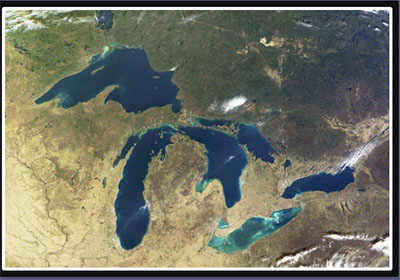Weber State Graduate Wins National Environmental Data Challenge
OGDEN, Utah – Andrew Whetten, a 2017 Weber State University graduate in applied mathematics, was named the 2020 winner of the inaugural ENVR Data Challenge sponsored by the American Statistical Association (ASA) for his research using high-dimensional satellite weather data to identify the impact of climate change on water levels of the Great Lakes.
 Whetten, with support from brother Ryan Whetten and friend Joseph Paulson, identified that a relatively new branch of statistics, Functional Data Analysis, had not been implemented on high-dimensional satellite weather data to explore climate change. Functional Data Analysis methods provide information about curves varying over some continuum, such as time. The sample element, in such an analysis, is the functional behavior of both temperature and precipitation rather than a single measurement of the respective variables.
Whetten, with support from brother Ryan Whetten and friend Joseph Paulson, identified that a relatively new branch of statistics, Functional Data Analysis, had not been implemented on high-dimensional satellite weather data to explore climate change. Functional Data Analysis methods provide information about curves varying over some continuum, such as time. The sample element, in such an analysis, is the functional behavior of both temperature and precipitation rather than a single measurement of the respective variables.
The group analyzed the ERA-Interim, an atmospheric data set, generously provided by Jupiter Intelligence, a climate science research corporation. This data captured daily precipitation, maximum temperatures, and minimum temperature readings that spanned from Mexico to central Canada and ranged from the years 1979-2017 on a 80 km (kilometer) resolution. “That is a lot of data, approximately 227 million observations or somewhere around 4 gigabytes,” Whetten said.
The first critical findings were identified by performing a functional cluster analysis, an unsupervised machine-learning technique, which seeks to group functions by similar features. At this point, the group detected distinct and intuitive climate regions across North America, evidence of climate change in several regions and a clear separation in climate patterns between the Great Lakes and the surrounding region. These findings attested to the quality of their model and inspired the remainder of their project.
Their analysis of the water levels of the Great Lakes over the past 40 years identified an increasing effect of maximum temperature and precipitation on water levels during the past 20 years. The Great Lakes supply 84% of North America’s freshwater and perform critical ecosystem functions. Understanding the long-term impact of these effects provides opportunities for solving water resource management and conservation dilemmas.
Whetten began his research December 2019 and, although the coronavirus pandemic ensued, he sacrificed six weeks of income as a consulting biostatistician for the International Chiropractic Pediatric Association to meet the application deadline.
“One thing my father said multiple times was ‘In every time of crisis and hardship, there is immeasurable opportunity.’” Whetten said.
Whetten credits his wife, Hailey Whetten, a Weber State graduate and 2016 Big Sky Conference champion in the 10,000 meters, for her flexibility to keep the family going on a reduced income. Whetten said he and Hailey, who is currently in the final year of her master’s degree, have both taken turns making sacrifices in order to succeed with their individual academic and athletic pursuits.
 When the research was complete, Whetten’s brother Ryan helped finalize the product by coaching him on how to create an interactive applet for presenting the results, and his friend and fellow Ph.D. candidate Paulson supported the analysis and construction of the paper’s narrative.
When the research was complete, Whetten’s brother Ryan helped finalize the product by coaching him on how to create an interactive applet for presenting the results, and his friend and fellow Ph.D. candidate Paulson supported the analysis and construction of the paper’s narrative.
“This opportunity required having the right ideas, at the right time, with the right skill set and a conducive support network,” Whetten said.
They have been invited to present their results at the 2021 ENVR Workshop in Provo.
Whetten attended WSU to compete on the track team in the 800-meter, 1500-meter and cross country. Health concerns ended his athletic career early, but he was encouraged to continue to focus on his academic future. Mathematics always came naturally to him, and he found great support at the university.
“One of my favorite aspects of the academic environment at WSU is that if you have a desire/motivation to feel important and valued as a student, there are faculty willing to encourage you,” Whetten said. “At Weber State, I never felt like I had to fight for the attention or support of my professors. They were accessible and patient and invested. They were interested in me and took time to give me advice about my future.”
Whetten was a hard-working, well-liked student and the math department continues to cheer his success.
“This is a major achievement to win first place with an organization such as the ASA,” said Julian Chan, professor of mathematics. “A competition, open to all students across the country, reflects a national achievement.”
Whetten’s success also shines a positive light on the College of Science’s new degrees: Statistics/Data Science and Environmental Science.
Whetten has completed his master’s degree in statistics from Utah State University and is now working on his Ph.D. at University of Wisconsin-Milwaukee. Whetten loves teaching, engaging with students and his personal research.
“Though some options in the industry will likely present themselves, my plan is to continue in academia as a professor,” Whetten said.
For more information about the research, visit the interactive applet https://abwhetten.shinyapps.io/era-interim_fda/.
For more information about the College of Science, visit weber.edu/cos.
To learn more about Weber State University, visit weber.edu/wsutoday
Ali Miller, College of Science
801-698-4599 • amiller@weber.edu- Contact:
Ali Miller, College of Science
801-698-4599 • amiller@weber.edu